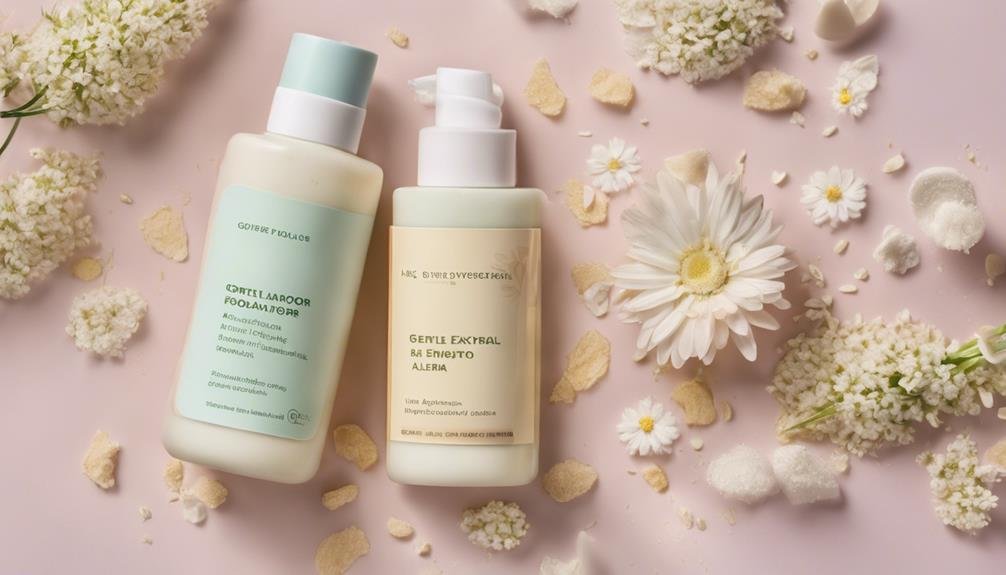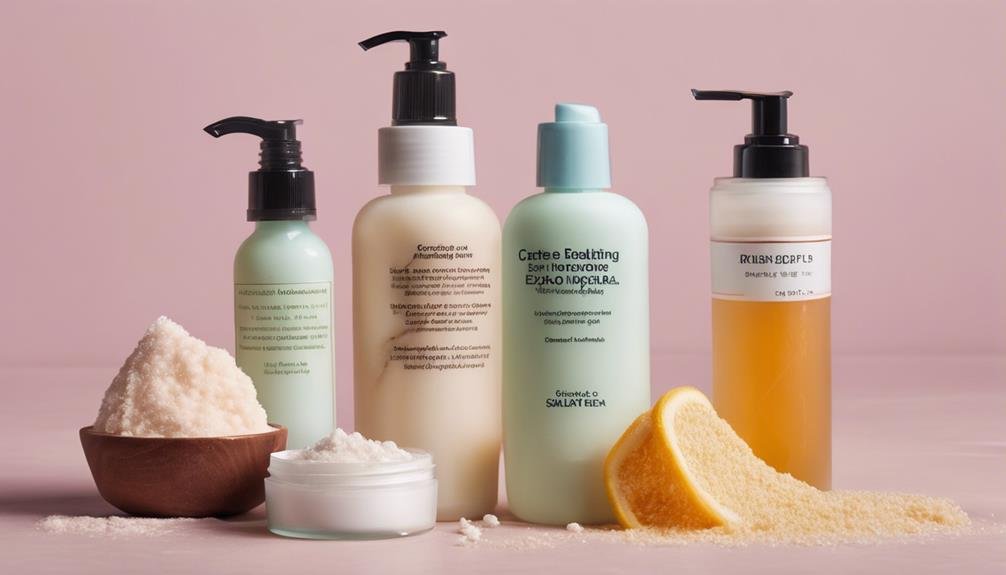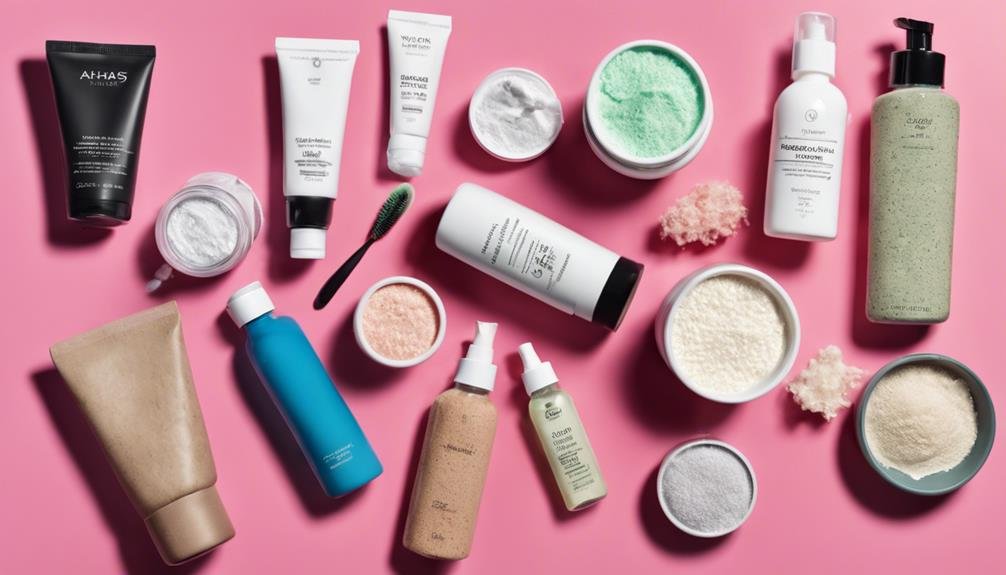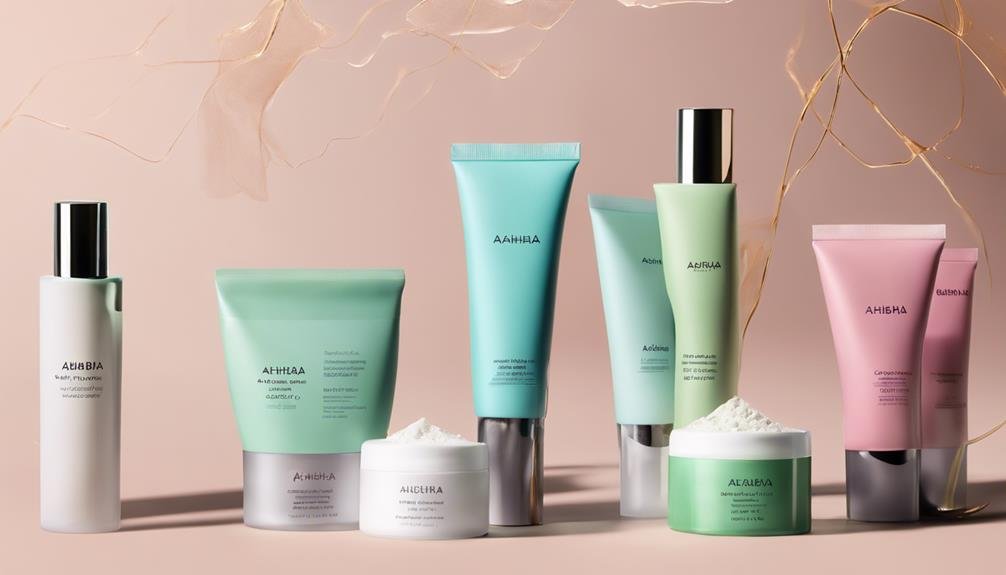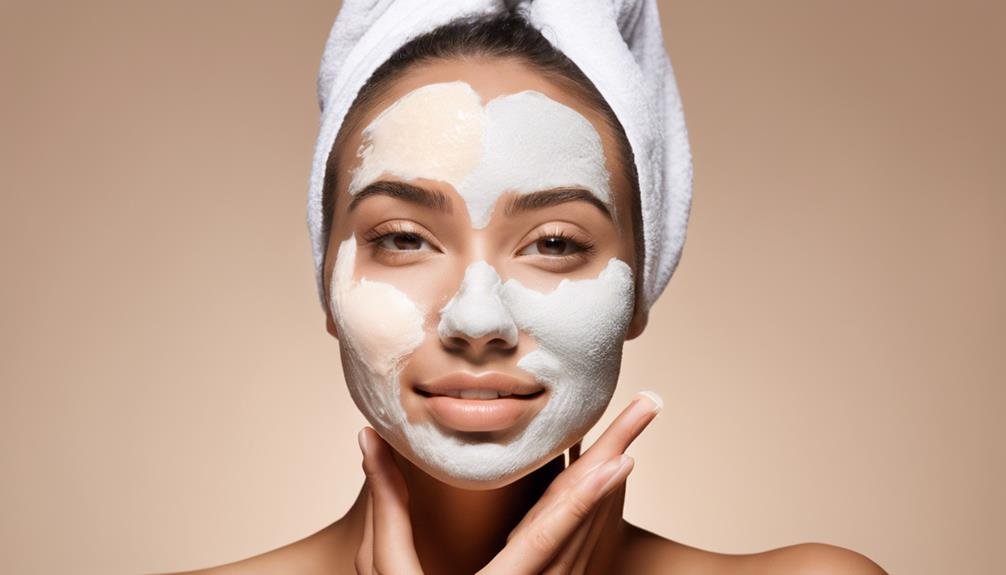When it comes to skincare, choosing the right exfoliator for your skin type can make a world of difference in achieving a healthy glow. From dry to oily, sensitive to combination, each skin type requires a tailored approach to exfoliation. By understanding the specific needs of your skin, you can unlock the key to a smoother, more radiant complexion. But how do you navigate the sea of options available and pinpoint the perfect exfoliator for you? Stay tuned to discover the best exfoliators catered to every skin type and unveil the secret to achieving your skin goals.
Key Takeaways
- Choose hyaluronic acid or glycolic acid for dry skin's hydration and gentle exfoliation.
- Opt for salicylic acid or lactic acid for oily skin's oil control and deep exfoliation.
- Use soothing ingredients for sensitive skin and avoid harsh physical exfoliants.
- Balance combination skin with salicylic acid for oily areas and gentle exfoliation for dry areas.
- Address acne-prone skin with salicylic or glycolic acid and avoid harsh scrubs to prevent irritation.
Dry Skin Exfoliators
When it comes to caring for your dry skin, choosing the right exfoliator is crucial to maintain a healthy and radiant complexion. Dry skin tends to lack moisture and can appear flaky or rough if not properly cared for. Look for exfoliators that are gentle and hydrating to avoid further stripping your skin of its natural oils. Ingredients like hyaluronic acid, glycerin, and ceramides can help replenish moisture while exfoliating dead skin cells.
Opt for chemical exfoliants such as alpha hydroxy acids (AHAs) like glycolic acid or lactic acid, which can effectively remove dead skin cells without causing irritation. These ingredients work by breaking down the bonds between skin cells, revealing a smoother and more radiant complexion underneath.
Additionally, consider incorporating a gentle physical exfoliator with small, round beads or particles to provide a deeper cleanse without causing micro-tears in the skin.
Remember to exfoliate no more than 1-2 times a week to prevent over-exfoliation, which can further dry out your skin. Always follow up with a rich moisturizer to lock in hydration and keep your skin looking and feeling its best.
Oily Skin Exfoliators
To effectively address oily skin concerns, selecting the right exfoliator is essential for maintaining a balanced and clear complexion. Oily skin tends to produce excess sebum, leading to clogged pores and potential breakouts. Look for exfoliators containing salicylic acid, glycolic acid, or lactic acid, as these ingredients help to unclog pores, reduce oiliness, and promote skin cell turnover.
Salicylic acid, a beta hydroxy acid (BHA), penetrates deep into pores, effectively removing excess oil and dead skin cells. Glycolic acid, an alpha hydroxy acid (AHA), exfoliates the skin's surface and promotes cell turnover, resulting in a smoother complexion. Lactic acid is another gentle AHA that exfoliates and hydrates the skin simultaneously.
When choosing an exfoliator for oily skin, opt for a product that's oil-free and non-comedogenic to prevent further clogging of pores. Remember to exfoliate no more than 2-3 times a week to avoid over-exfoliation, which can irritate and exacerbate oiliness.
Sensitive Skin Exfoliators
For individuals with sensitive skin, selecting the right exfoliator is crucial to avoid irritation and maintain skin health. Opt for exfoliators that are gentle yet effective in removing dead skin cells without causing redness or inflammation. Look for products with ingredients like colloidal oatmeal, jojoba beads, or fruit enzymes, as these are soothing and less likely to trigger sensitivity.
Avoid harsh physical exfoliants such as rough scrubs or brushes, as they can cause micro-tears in the skin. Instead, consider chemical exfoliants like lactic acid or mandelic acid, which are milder and work by dissolving dead skin cells.
Patch testing new products is essential for sensitive skin types to ensure they won't cause adverse reactions. Start by using the exfoliator once or twice a week and gradually increase frequency if your skin tolerates it well.
Remember to always follow up with a gentle moisturizer to keep your skin hydrated and protected after exfoliating. Consistent exfoliation with the right products can help improve skin texture and radiance without compromising its delicate nature.
Combination Skin Exfoliators
When dealing with combination skin, finding the right exfoliator is key to balancing oily and dry areas while maintaining overall skin health. Look for exfoliators that are gentle yet effective, as harsh products can strip the skin of essential oils, exacerbating both dryness and oiliness. Opt for exfoliators containing ingredients like salicylic acid, which can help unclog pores in oilier areas, while also being gentle enough for drier patches.
Additionally, ingredients such as glycolic acid can help improve skin texture and tone without causing irritation.
Consider using a physical exfoliator with fine particles or a chemical exfoliator with alpha hydroxy acids (AHAs) and beta hydroxy acids (BHAs) to target different skin concerns in various areas. Remember to follow up with a moisturizer to keep your skin hydrated and balanced after exfoliating. Always patch test new products to ensure they suit your skin type before incorporating them into your skincare routine.
Acne-Prone Skin Exfoliators
For those with acne-prone skin, selecting the right exfoliator is crucial in managing breakouts and promoting clearer skin. When dealing with acne, it's important to choose exfoliators that are gentle yet effective in unclogging pores and reducing inflammation.
Look for products containing salicylic acid, a beta hydroxy acid known for its ability to penetrate oil to exfoliate inside the pores, preventing breakouts. Another excellent option is a glycolic acid exfoliator, which helps to remove dead skin cells on the surface, revealing smoother skin and improving overall texture.
Physical exfoliants with gentle beads or enzymes can also be beneficial, but be cautious with harsh scrubs that can irritate acne-prone skin. Remember to exfoliate no more than 2-3 times a week to avoid over-exfoliation, which can exacerbate acne.
Always follow up with a lightweight, non-comedogenic moisturizer to keep the skin hydrated and balanced. By choosing the right exfoliator tailored to acne-prone skin, you can effectively manage breakouts and achieve a clearer complexion.
Mature Skin Exfoliators
Navigating the realm of exfoliators for mature skin requires a tailored approach that addresses specific concerns related to aging. As skin matures, cell turnover slows down, leading to dullness, fine lines, and uneven texture. Look for exfoliators that gently remove dead skin cells while promoting collagen production and hydration. Ingredients like alpha hydroxy acids (AHAs) such as glycolic acid and lactic acid are excellent choices for mature skin as they help to brighten and improve skin elasticity.
Consider incorporating products with antioxidants like vitamin C to combat free radicals that contribute to aging. Physical exfoliants with soft particles such as jojoba beads or rice powder can also be beneficial for mature skin, offering a gentle mechanical exfoliation.
Remember to follow up with a rich moisturizer to nourish and protect the newly revealed skin. Always patch-test new products and consult with a dermatologist to find the best exfoliation routine for your specific skin concerns.
Dull Skin Exfoliators
To address dull skin concerns effectively, selecting the right exfoliator is key. Dull skin can be caused by a buildup of dead skin cells, leading to a lackluster complexion. Look for exfoliators that contain ingredients such as alpha hydroxy acids (AHAs) like glycolic acid or lactic acid. These chemical exfoliants work to gently dissolve dead skin cells, revealing brighter skin underneath.
Physical exfoliants with fine particles like rice bran or jojoba beads can also help slough off dulling skin cells.
When choosing an exfoliator for dull skin, opt for products that are gentle yet effective. Harsh exfoliation can irritate the skin and worsen the dullness. It's recommended to exfoliate dull skin 2-3 times a week to maintain a healthy glow.
Remember to follow up with a good moisturizer to keep the skin hydrated and radiant. By incorporating the right exfoliator into your skincare routine, you can say goodbye to dull skin and hello to a more vibrant complexion.
Normal Skin Exfoliators
Achieving radiant skin requires choosing the right exfoliator tailored to your normal skin type. Normal skin is often characterized by balanced moisture levels and few skin concerns, making it essential to maintain this harmony with gentle exfoliation.
Opt for exfoliators that contain mild ingredients like fruit enzymes, lactic acid, or glycolic acid to help slough off dead skin cells without causing irritation. These ingredients work effectively to reveal fresh, glowing skin without disrupting your skin's natural balance.
Look for exfoliators with a creamy or gel-like texture that can be easily massaged onto your skin. Avoid harsh physical exfoliants like rough scrubs, as they can be too abrasive for normal skin and lead to micro-tears.
Aim to exfoliate 1-2 times per week to maintain smooth and radiant skin. Remember to follow up with a hydrating moisturizer to keep your skin nourished and protected after exfoliation. By choosing the right exfoliator for your normal skin type, you can achieve a healthy and luminous complexion effortlessly.
Uneven Skin Tone Exfoliators
For those with uneven skin tone, selecting the right exfoliator is key to promoting a more balanced complexion. Uneven skin tone can be caused by factors like hyperpigmentation, sun damage, or post-inflammatory hyperpigmentation. To address this concern, look for exfoliators that contain ingredients like alpha hydroxy acids (AHAs) such as glycolic acid or lactic acid. These ingredients help to gently slough off dead skin cells, revealing a brighter and more even skin tone.
Another effective option for uneven skin tone is beta hydroxy acid (BHA), specifically salicylic acid. BHA exfoliants work well for those with oily or acne-prone skin as they can penetrate oil-filled pores, helping to improve skin texture and tone.
Additionally, incorporating vitamin C into your exfoliation routine can help brighten skin and fade dark spots over time. When using exfoliators for uneven skin tone, it's essential to start slowly and gradually increase frequency to prevent irritation. Remember to always follow up with sunscreen during the day to protect your skin from further damage.
Sun-Damaged Skin Exfoliators
Sun-damaged skin requires specialized exfoliators to help repair and rejuvenate the skin's surface. When choosing an exfoliator for sun-damaged skin, opt for gentle yet effective formulas that can address the damage caused by UV rays. Look for exfoliators containing ingredients like alpha hydroxy acids (AHAs) or beta hydroxy acids (BHAs) to help slough off dead skin cells and promote cell turnover. These ingredients can also aid in fading sunspots and fine lines, common issues associated with sun-damaged skin.
Exfoliating scrubs with fine particles can physically remove dead skin cells while being gentle enough not to cause further irritation to sun-damaged skin.
Additionally, consider incorporating a chemical exfoliant with ingredients such as glycolic acid or salicylic acid into your skincare routine. These chemical exfoliants work to dissolve dead skin cells and reveal a brighter, more even complexion underneath.
Remember to always follow exfoliation with a broad-spectrum sunscreen to protect your newly revealed skin from further sun damage. A consistent exfoliation routine can help improve the appearance and texture of sun-damaged skin over time.
Hyperpigmentation Exfoliators
To effectively address hyperpigmentation, selecting exfoliators tailored to this specific skin concern is crucial. Look for exfoliators containing ingredients like glycolic acid, which helps to fade dark spots and even out skin tone. Another effective ingredient is kojic acid, known for its skin-brightening properties. These exfoliators work by encouraging cell turnover, revealing fresh skin underneath and reducing the appearance of hyperpigmentation over time.
When choosing a hyperpigmentation exfoliator, consider products with gentle exfoliating agents to prevent irritation. It's essential to use these exfoliators consistently but gently to avoid exacerbating the issue.
Incorporating a hyperpigmentation exfoliator into your skincare routine a few times a week can lead to noticeable improvements in skin tone and texture.
Remember to follow up with a broad-spectrum sunscreen during the day, as exfoliating ingredients can increase sun sensitivity. With patience and the right exfoliator, you can effectively combat hyperpigmentation and achieve a more even complexion.
All-Natural Skin Exfoliators
Utilizing natural ingredients in your skincare routine can offer gentle yet effective exfoliation for various skin types. All-natural skin exfoliators are a great choice for those looking to avoid harsh chemicals while still achieving a radiant complexion. Here are some options to consider:
- Oatmeal Scrub: Ground oatmeal mixed with water or honey can provide a soothing exfoliation, ideal for sensitive skin types.
- Sugar Scrub: A mixture of sugar and coconut oil can buff away dead skin cells while hydrating the skin, perfect for dry skin.
- Coffee Grounds Scrub: Coffee grounds combined with olive oil can help invigorate the skin and reduce the appearance of cellulite, great for dull or rough skin.
- Fruit Enzyme Peel: Pineapple or papaya enzymes can gently exfoliate the skin, making it suitable for those with acne-prone or aging skin.
Incorporating these natural exfoliators into your routine can help you achieve a healthy glow while being mindful of what you're putting on your skin.
Frequently Asked Questions
Can I Use Exfoliators Every Day?
You can use exfoliators every day, but it's essential to be gentle. Over-exfoliation can damage your skin barrier. Opt for mild exfoliants with ingredients like glycolic acid or lactic acid for daily use. Always follow up with moisturizer.
Should I Exfoliate in the Morning or Evening?
To maximize benefits, exfoliate in the evening. This allows your skin to repair overnight. Morning exfoliation may make your skin more sensitive to sun exposure. Consistency is key, aim for 1-3 times a week.
Can Exfoliating Worsen Skin Conditions?
Exfoliating can worsen skin conditions if done excessively or with harsh products. It can lead to irritation, redness, and even breakouts. Consult a dermatologist for personalized advice on how to safely incorporate exfoliation into your skincare routine.
Can I Use Exfoliators on My Body?
You can use exfoliators on your body to remove dead skin cells and reveal smoother, brighter skin. Remember to choose a gentle exfoliator suitable for your skin type and avoid over-exfoliating to prevent irritation.
How Do I Choose the Right Exfoliator for Me?
To choose the right exfoliator for you, consider your skin type and concerns. Look for gentle exfoliants like lactic acid for sensitive skin, salicylic acid for acne-prone skin, and physical exfoliants for tougher skin. Consult a dermatologist for personalized advice.
Conclusion
In conclusion, finding the best exfoliator for your skin type is essential for achieving a healthy complexion. By understanding your skin's specific needs and choosing the right exfoliating ingredients, you can effectively address issues such as dryness, oiliness, sensitivity, acne, uneven skin tone, sun damage, and hyperpigmentation. With the wide range of exfoliators available, you can tailor your skincare routine to target your individual concerns and achieve a radiant, smooth, and balanced complexion.



